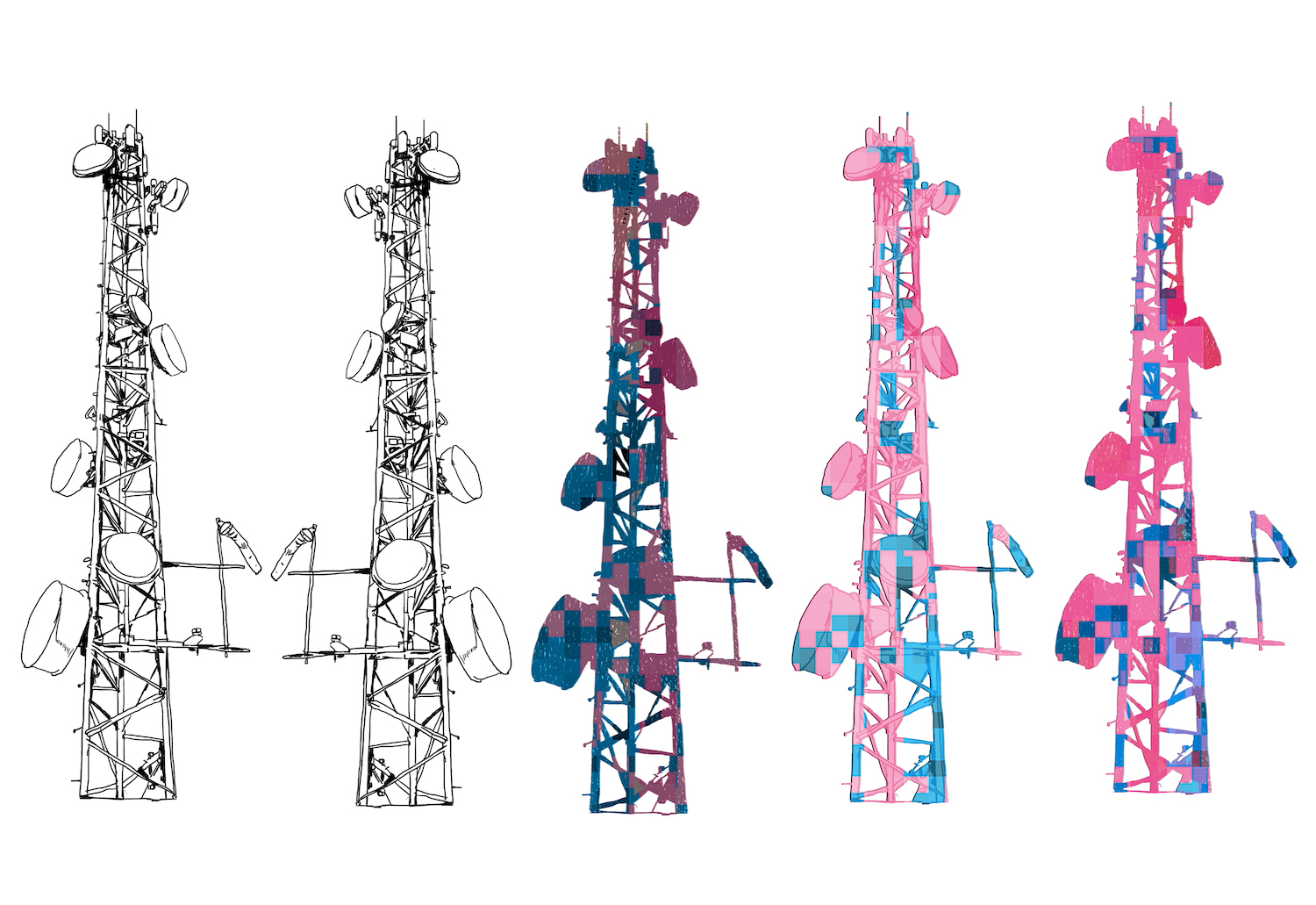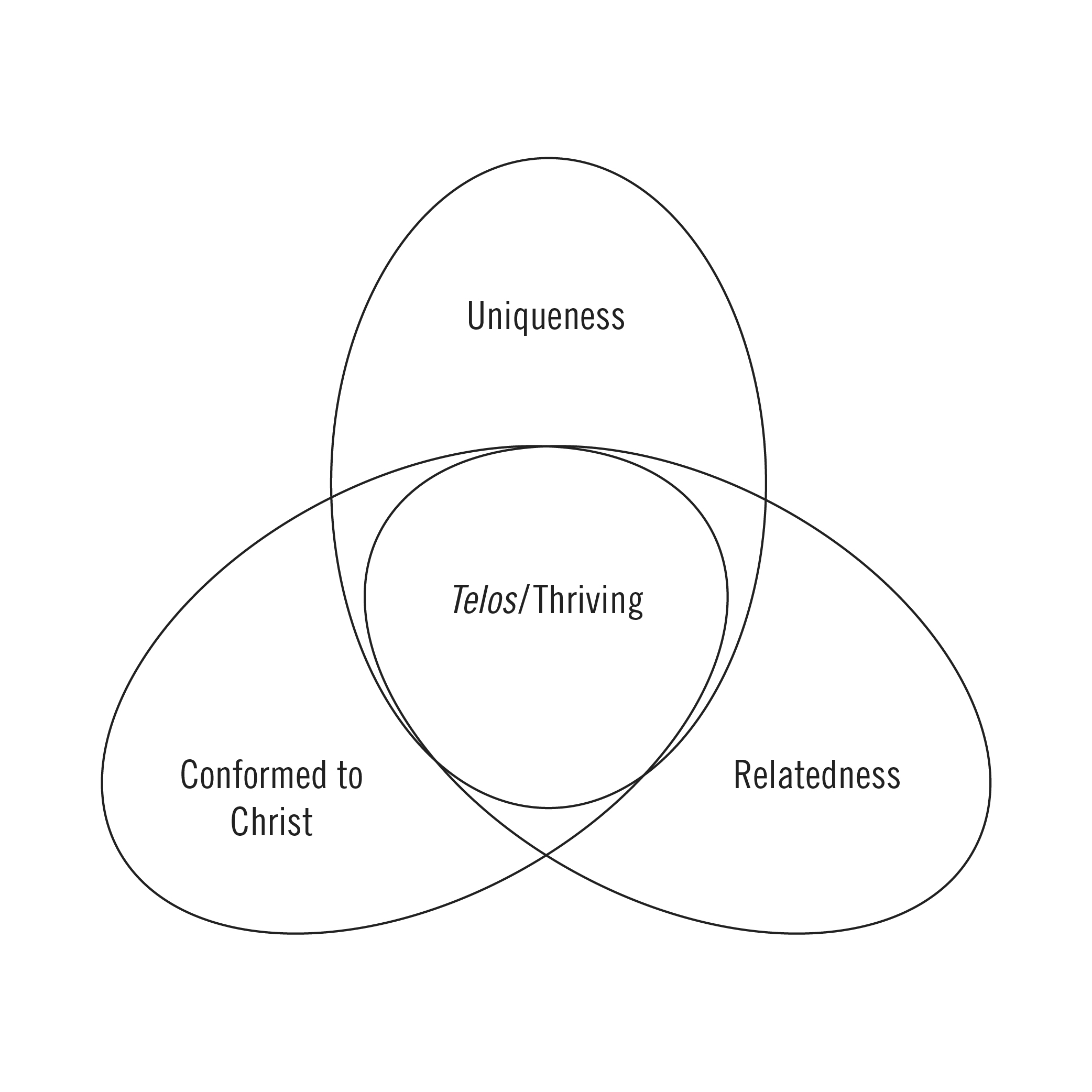
As a faculty member in the Thrive Center in the School of Psychology at Fuller, I am often asked, “What does it mean to thrive?” The second question I am asked is “What about technology and thriving?” Everyone from Kaiser Permanente to Arianna Huffington, president of Thrive Global, is using the language of thriving. Yet, despite its popularity, it’s hard to find a substantive definition of the word. With 10 years of theoretically predicated research and deep theological reflection, the Thrive Center hopes to move “thriving” beyond buzzword status. More important, we aim to promote the notion of thriving as a hopeful vision for all people.1 After all, who wants a society in which people merely survive? To thrive in the deepest sense of the word is something far more life-giving and generative than mere survival.
The second question about technology and thriving is often asked with a knowing eye and a tone insinuating that technology is a threat to human thriving. No doubt current research reveals the negative effects of technology on the young and old alike,2 but technology is not inherently problematic. Rather the ends to which it is used (whether intentionally or unintentionally) is the problem. Given the rapid proliferation of technological innovations from social media to artificial intelligence to transhumanism, there is no time like the present to pause and deeply consider how technology can help rather than hinder human thriving. The recent opening of the Stanford Center on Human-Centered Artificial Intelligence is an example of society’s increasing desire for technology to promote not just human or individual thriving but societal and environmental flourishing as well. (For the perspective of one artificial intelligence expert, see the sidebar featuring an interview with my brother, Michael Ebstyne, director of AI strategy for Microsoft.) In the following, I discuss thriving from theological and psychological perspectives and identify three core resources for thriving that technology can promote.
What Is Thriving?
Thriving sure sounds good, but what does it mean to thrive? As Christians, it’s never a bad idea to start with Jesus. After all, Jesus said, “I have come that you might have life and live it to the fullest” (John 10:10). What on earth or in heaven was Jesus talking about when he said that? I appreciate George Eldon Ladd Professor of New Testament Marianne Meye Thompson’s suggestion: the abundant life to which Jesus referred is one lived at the intersection of the goodness and fullness of life in God’s creation now and the surpassing fullness of eternal life.3 Generally speaking, thriving is this abundant life or fullness. From this standpoint, thriving is an eschatological term—one that includes our life lived in the here and now among God’s creation, but which does not come to completion this side of eternity.
Given that thriving involves the present but also a sense of eventual completion, I have found the term telos helpful. Telos is the Greek word for “purpose,” “goal,” or “completion.” In both its theological and psychological senses, “teleology” refers to the study or understanding of the purpose of being human. As a psychologist, I draw on telos to understand the goal of human development. In other words, telos refers to the purpose of humankind. From my perspective the answer to the question “what is thriving?” involves understanding the purposes for which God created humans. I follow the trail of countless theologians and lean heavily on the doctrine of the image of God, or the imago Dei, to understand unique aspects of human creation (Gen 1:26).4 Consequently, I understand the goal for humankind in three ways.
 Conformity to Christ. First, as Christians we affirm that we are made in the image of God. The Bible tells us that Christ is the perfect image of God. Becoming like Christ is part of our telos (see figure 1). Being conformed to the likeness of the image of God in Christ is a shared telos among humans. Therefore, we take on the ways of Christ and grow toward the character of Christ. The life of Christ recorded in the Bible provides a pattern of redeeming, healing, freeing, and so on for us to follow. (I’m pretty sure that when Jesus said, “Follow me!” he was not referring to his Twitter handle!) Consequently, to thrive is to become more like Christ.
Conformity to Christ. First, as Christians we affirm that we are made in the image of God. The Bible tells us that Christ is the perfect image of God. Becoming like Christ is part of our telos (see figure 1). Being conformed to the likeness of the image of God in Christ is a shared telos among humans. Therefore, we take on the ways of Christ and grow toward the character of Christ. The life of Christ recorded in the Bible provides a pattern of redeeming, healing, freeing, and so on for us to follow. (I’m pretty sure that when Jesus said, “Follow me!” he was not referring to his Twitter handle!) Consequently, to thrive is to become more like Christ.
Human uniqueness. Second, although we are called to be conformed to the image of God in Christ, this call to conformity does not mean uniformity with Christ. The Bible never suggests that we are to become Christ; rather, we are to become like Christ as ourselves. I strongly believe that an element of our telos is to be and become more fully the unique person that God created us each to be. This involves developing our unique constellation of gifts and leaning into our deepest passions and sense of calling.
Human relatedness. As much as this telos concerns human uniqueness, it insists on relatedness. One of my early seminary professors, the late Ray Anderson, used to say, “God is being in communion.” Created in God’s image, we too are created to be in communion—in relationship—with God, humankind, and God’s creation. All believers are called by God to be a part of a community, placed in the body of Christ by the Spirit (1 Cor 12:13). Thus, thriving is not individualism run amuck. It is not unbridled humanism. From a biblical perspective, we are not renegade selves that develop to our fullest potential without regard for one another. Thriving is not just about “me.” In fact, it’s the turning “me” on its head to find “we.” For me to thrive, we must thrive.
Human telos involves understanding how we fit with the people and world around us. We are created to live in reciprocity with the people, societies, and environment that surround us. Frederick Buechner is often quoted in discussions like this. He states that vocation is the place where our deepest gladness intersects with the world’s deepest hunger.5 Not only is our engagement with the world part of our telos, but our ongoing relatedness to God, others, and the world leads us to a deepening discovery of our places of contribution, vocation, and ultimately of our telos. As such, a distinguishing aspect of thriving is contributing beyond the self—at all ages.6 What this contribution looks like at different ages and in different cultures varies. The important point is that thriving is not just doing well, being successful, or even living up to one’s own potential; it is also giving back as we are conformed to Christ.
Figure 1 illustrates this threefold understanding of telos and thriving. The overlapping ovals convey that thriving involves God’s intention for us to become (1) more like Christ, (2) more and more our unique selves, and (3) more deeply related to God, humankind, and creation. Thriving occurs as we grow closer to living more fully at the intersection of our strengths and passions, relatedness, and meaningful contributions and become more like Christ.
At the overlap of these areas we get a “hot spot.” It is where we feel animated and alive. It is where we are most aware of God working through us. It is where we feel joy and vitality, where we find resilience and the ability to overcome obstacles and suffering. Life lived in this zone matters—it is deeply connected to our truest selves and those around us. It is where we feel most aligned with God’s Spirit. Given that thriving occurs uniquely for all persons in their own time and place, there are no universal absolutes or benchmarks of thriving. We all thrive in different ways based on how we become like Christ as our unique selves and how we connect with and contribute to the communities around us.
Thriving as Direction
Thriving is not a destination, but it has a direction. Thriving is best understood as a journey of transformation toward our telos. In other words, thriving occurs on our way toward our unique telos through the ups and downs of life. Additionally, the concept of telos provides an important distinction from Merriam-Webster’s definition of thriving: “to grow or develop vigorously; to flourish.” As much as humans are captivated with vigorous growth and vitality, it’s important to ask, “Which direction is one growing?” For example, to grow in habits of addiction or cheating is not thriving. Telos provides a lens through which to view what is true thriving—growing toward what God intended—and to evaluate what promotes thriving.
Technology and Thriving
This framework of telos provides a means for understanding how technology can help or hinder thriving. From this perspective, technology—whether social media, virtual reality, or artificial intelligence—can help people thrive when it enables them to (1) become more authentic and to live more into their strengths; (2) connect and contribute in meaningful and life-giving ways to God, others, and our earth; and (3) grow in the character and ways of Christ and/or refine their ethics that guide their life.
This is a sharp contrast to most of the New York Times bestsellers, which promise to promote individual thriving or well-being. Thriving is not about self-fulfillment, but about fullness of life in Christ. A deep theological and psychological understanding of thriving insists on transcendence—and requires the self’s relationship with ultimacy, humanity, and creation. As Christians, we understand transcendence in terms of our relationship with God through Jesus Christ, but in order to engage the broader public in a vision of thriving, we point people and communities toward pursuing thriving through growing in individual strengths, contributing to the greater good, and refining their ethics and source of meaning in a way that propels and guides them to become responsible and fulfilled adults.
In regard to thriving, technology needs to be viewed as a potential source of transformation, not mere information. Whether taking the perspective of science or spirituality, human transformation ultimately occurs through love—the process of being known and knowing another. This is true in the context of our relationship with God, with our families, friends, or even strangers. Perhaps it’s worth a moment to reflect upon the most transformative moments in your own life. These experiences, whether pleasant or difficult, are often marked by ever deepening encounters with the self and with another in a way that brings about change—whether reordering of priorities, clarification of identity and values, identification of strengths or weaknesses, or a sense of inner freedom. How does technology enable these ends? Technology offers many opportunities for transformation toward telos, especially when it promotes these three essentials for thriving: relationships, beliefs and values, and practices that promote purpose.7
Distill, don’t dilute relationships. My late mentor and namesake of the endowed professorship that I occupy, Peter Benson, used to say, “Relationships are the oxygen of thriving.” Humans grow in and through relationships. We grow when we deeply know and are known by others. Thus, technology is an asset for human thriving when it distills rather than dilutes relationships. In other words, when it comes to relationships, more is not always better. When technology enables us to go deeper with God or with those we love and are loved by, technology is a friend to thriving. When technology dilutes our relationships, technology is a foe to thriving.
Unmitigated technology use is currently impacting our relational capacities by replacing time with actual humans and inhibiting the development of social skills. Such use spreads us too thin—beyond our relational capacity—among our many digital “friends,” develops a false sense of emotional intimacy without the accountability of actual relationships, and promotes unchecked individualism that is compromising the development of civic virtues and responsibilities. Although increasing rates of depression and anxiety among adults are evidence of the ill effects of copious amounts of “screen time,” young people with developing minds are also more at risk for social, civic, moral, and spiritual (de)formation. Research shows that optimal brain development occurs in the context of emotionally connected individuals. Thriving minds depend on having emotions mirrored through another person’s facial expressions, movement, touch, and even scent; the experience of positive emotions; and a certain pace of interaction. Technology cannot fully replace the human encounter. However, technologies that can encourage a sense of being known, being loved, and mattering may be helpful to promote thriving.
Tech Tip on Relationships: When reflecting on your use of technology, ask yourself: (1) Does it get in the way of or replace human interaction? Social skills are becoming a dying art form. (2) Is your use of technology promoting appropriate emotional intimacy? Does your engagement with social media simultaneously encourage transparency, vulnerability, and accountability? How and with whom? In your experience, which platforms promote your most meaningful encounters with others? Which platforms enable you to grow in authenticity and discover your strengths?
Recommendations: Although popular platforms like Facebook and Instagram can be used to cultivate depth rather than breadth of relationships, try exploring newer apps, like Riza (“root” in Greek), that are based on strength-based family systems and designed to cultivate a thriving digital ecology online (see www.riza.life).
Explore, don’t explode, beliefs and values. Essential to telos and thriving is having a true north and knowing what direction one is headed. If one does not know what truly matters, one will not be able to deliberately live a meaningful life—or thrive. Consequently, thriving involves clarifying one’s beliefs and values throughout one’s life. When it comes to thriving, I’m less concerned with telling people what to believe than insisting they believe in something.8 A growing reality in our globalized and increasingly secular world is that ethical and spiritual homogeneity no longer exist. Parents cannot rest on the laurels of raising their children in a Christian culture. Families, schools, and congregations need to actively equip young people with the necessary skills to continually explore and refine their ideological commitments as they mature.
How can technology assist different ages in this process? Technology can be a fantastic tool for exploration; however, it quickly can be overwhelming. Beneficial technology exposes users to diverse beliefs and values in a developmentally sensitive manner, enabling the user to explore, digest, and assimilate beliefs and values effectively. This occurs at conscious and unconscious levels. Jamie Smith’s explanation of cultural liturgies is extremely useful.9 We are formed and shaped by the activities, rituals, and habits we engage in—whether that’s participating in spiritual practices through an app or through playing Fortnight. We need to be mindful about how our screen time shapes and forms our being—our identity, narrative, values, and attention span. Although many technologies may influence our narratives indirectly, many other apps provide helpful exercises or assessments that intentionally assist the user in identifying their core beliefs and values about the world and also about themselves.
Tech Tip on Beliefs and Values: How does your technology use shape and form you directly or indirectly? Take inventory of how much time you spent on which apps in the last week and consider how engaging in these “cultural tools” might be shaping you. According to Smith, “We are what we love.” What do the apps you spend time on say about you? Are you into discovery? Connecting? Collecting? Playing?
Recommendations: Online resources geared toward shaping your worldview include everything from podcasts on myriad topics, to explicitly Christian apps that teach through the Bible, to those that offer more formative or reflective exercises like the Pray As You Go podcast, FULLER Formation, or FULLER studio’s Prayer of Examen app.
Practice makes purpose, not perfect. One of the greatest strides in psychological science is shifting one’s emphasis from perfectionism to purpose10—especially to the development of noble purpose.11 In fact, my best understanding of telos is living one’s purpose or vocation. Research overwhelmingly demonstrates that pursuing an attainable goal that is an expression of one’s deepest passions and that benefits the world beyond the self predicts life satisfaction and a host of other positive outcomes at various ages. Consequently, using technology to intentionally cultivate practices or habits that enable one to clarify and pursue one’s purpose contributes to thriving. From a psychological perspective this not only involves identifying activities that are meaningful, but also cultivating a deepening awareness of one’s core desires and motivations. Thus, purpose involves both what you do and why you do it.
Current neuroscience points to the plasticity of the human brain and our ability to be intentional about the manner in which we live our lives. Neuroscientists such as Richie Davidson at the Center for Healthy Minds at the University of Wisconsin have demonstrated the effectiveness of various forms of meditation for heightening awareness, focus, and purpose. In order to pursue one’s purpose, one needs sufficient regulation to be self-aware, stay on task, make wise decisions, and bounce back in the face of obstacles. Being purposeful takes initiative, creativity, stamina, resilience, and adaptability. These skills are essential to thriving and are developed less through information than through transformation. In other words, they are not skills one can acquire through taking notes (declarative knowledge), but are capacities gained through experiences (procedural knowledge) that often occur through practices or relationships.
Perhaps one of technology’s greatest boosts to thriving is the way in which it grants access to practices that support the identification of purpose and the psychological strengths necessary to pursue it.
Technology is available 24-7, and many apps allow one to design a rhythm of practices uniquely suited to pursuing one’s spiritual and psychological goals. Davidson draws the parallel between working out one’s body at a gym and working out one’s mind through contemplative practices. Whether using apps for prayer, lectio divina, or guided meditation, such practices can reduce anxiety and heighten mental clarity. In addition, practices of reflection and prayer can help users discern their sense of purpose or calling. For example, habitual participation in the Prayer of Examen, on- or offline, routinely calls to mind the themes of God’s presence and finding joy in one’s life. In addition, many apps are created to cultivate enduring character and psychological strengths (e.g., focus, empathy) that are necessary to live out one’s purpose.
Tech Tip on Purpose: Take a tech usage inventory. How does your tech use reflect what you love? How does it either reflect or inform your sense of purpose or calling?
Recommendations: Recent technological innovations provide opportunities to cultivate psychological skills that promote and sustain thriving. Work your mind out through the HealthyMinds app or try a free 10 days on Headspace. If you prefer platforms or apps that are developed by Christians for Christians, check out the many resources at www.prayasyougo.org or FULLER Formation. FULLER studio has produced and cultivated many visual meditations, as well as a Prayer of Examen app. If podcasts or videos can shape our psychological, moral, and spiritual lives, imagine how formative virtual and augmented reality experiences may be for intentional formation.
Research has demonstrated that unmitigated technology use shatters our concentration and sense of identity and scatters us among so many “friends” and followers in literal and virtual distant lands, that despite all our likes, we are isolated and often don’t feel loved. That said, when technology can be used to distill and not dilute relationships, to explore and not explode one’s values and beliefs, and to leverage practices to promote purpose, technology can be a resource for thriving. However, while technology may provide a rich digital ecology that promotes connection, character, and calling, it cannot replace the complexity and richness of human communities lived out in the goodness of God’s creation.
Whether we’re talking about the latest technological innovations or how to navigate the social media landscape in healthy ways, thriving involves being planted in fertile ground rich with ideological, relational, and transcendent resources that nurture and fortify one to grow into authentic, reciprocating, and more Christlike selves. Further, thriving matters because it provides a vision for humankind that does not just emphasize what Jesus has saved us from, but also points to what Jesus has saved us for: to participate in God’s ongoing work in this world as our unique selves and as we become more Christlike. From that standpoint I recommend being purposeful about technology use and say, “Thrive on!”
ENDNOTES
-
See the Thrive Center website: www.thethrivecenter.org.
-
For reviews, see N. Carr, The Shallows: What the Internet Is Doing to Our Brains (New York: Norton, 2011); D. Brooks, The Second Mountain: The Quest for a Moral Life (New York: Random House, 2019); J. Twenge, Generation Me (Revised and Updated): Why Today’s Young Americans Are More Confident, Assertive, Entitled and More Miserable than Ever Before (San Francisco: Simon & Schuster, 2014); K. Powell, A. Bamford, and B. Griffin, Every Parent’s Guide to Navigating Our Digital World (Pasadena: Fuller Youth Institute, 2018); A. Crouch, The Tech-Wise Family: Everyday Steps for Putting Technology in Its Proper Place (Grand Rapids: Baker Books, 2017).
-
M. M. Thompson, “Alpha and Omega—and Everything in Between: Jesus Christ and Human Flourishing,” in Envisioning the Good Life: Essays on God, Christ, and Human Flourishing in Honor of Miroslav Volf, ed. M. Croasmun, Z. Grozdanov, and R. McAnnally-Linz (Eugene, OR: Cascade, 2017).
-
See P. E. King, “The Reciprocating Self: Trinitarian and Christological Anthropologies of Being and Becoming,” Journal of Christianity and Psychology 35, no. 3 (2016): 15–32; J. O. Balswick, P. E. King, and K. S. Reimer, The Reciprocating Self: Human Development in Theological Perspective, 2nd ed. (Downers Grove, IL: IVP Academic, 2016); P. E. King and W. Whitney, “What’s the ‘Positive’ in Positive Psychology: Teleological Considerations Based on Creation and Imago Doctrines,” Journal of Psychology and Theology 43, no. 1 (2015): 47–59.
-
F. Buechner, Wishful Thinking: Theological ABC’s (New York: Harper & Row, 1993).
-
For additional discussion of theological perspectives on thriving, see King and Whitney, “What’s the ‘Positive’ in Positive Psychology?” and for a similar understanding of individual and communal flourishing, see M. Volf and M. Croasmun, For the Life of the World: Theology that Makes a Difference (Grand Rapids: Brazos Press, 2019).
-
A growing body of research on thriving identifies these three practical resources as key components for thriving. See S. A. Schnitker, P. E. King, and B. Houltberg, “Religion, Spirituality, and Thriving: Transcendent Narrative, Virtue, and Lived Purpose,” in Journal of Research on Adolescence, special section: Processes of Religious and Spiritual Influence in Adolescence, ed. S. Hardy and P. E. King (2019).
-
It is important to note that not all ideologies are created equal and many are destructive to the self or to others. The threefold framework of telos in this article can be used to evaluate the constructiveness of ideologies. Belief systems that promote individual, communal, and ethical flourishing are conducive to thriving. Given that irreconcilable differences between worldviews will always arise, humility and the conviction of human dignity are necessary to sustain civility.
-
J. K. A. Smith, You Are What You Love: The Spiritual Power of Habit (Grand Rapids: Brazos, 2016).
-
See B. Houltberg, “Moving from Performance to Purpose in Youth Sports,” FULLER Studio, https://fullerstudio.fuller.edu/moving-performance-purpose-youth-sports/.
-
W. Damon, The Path to Purpose: Helping our Children Find Their Calling in Life (New York: Free Press, 2008).


